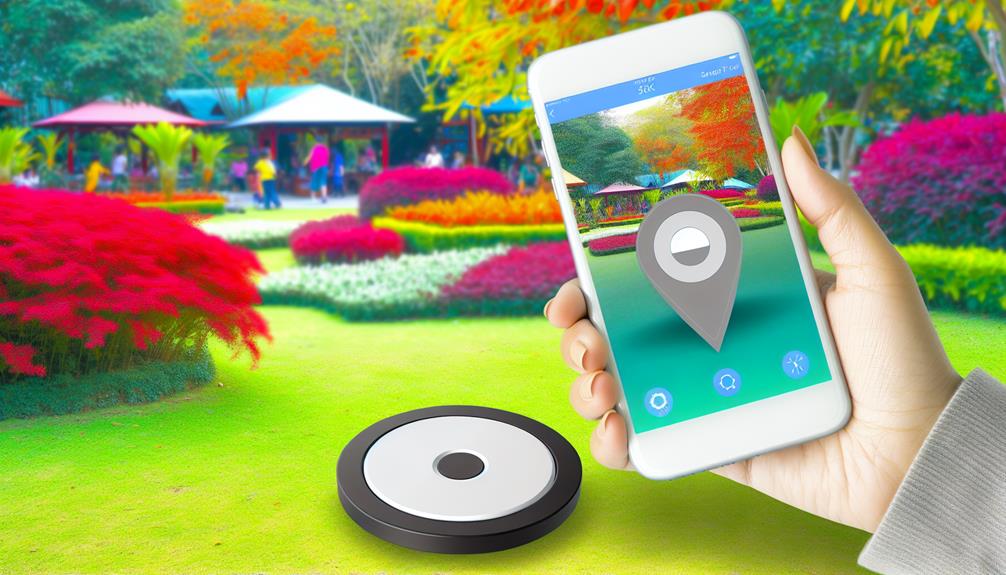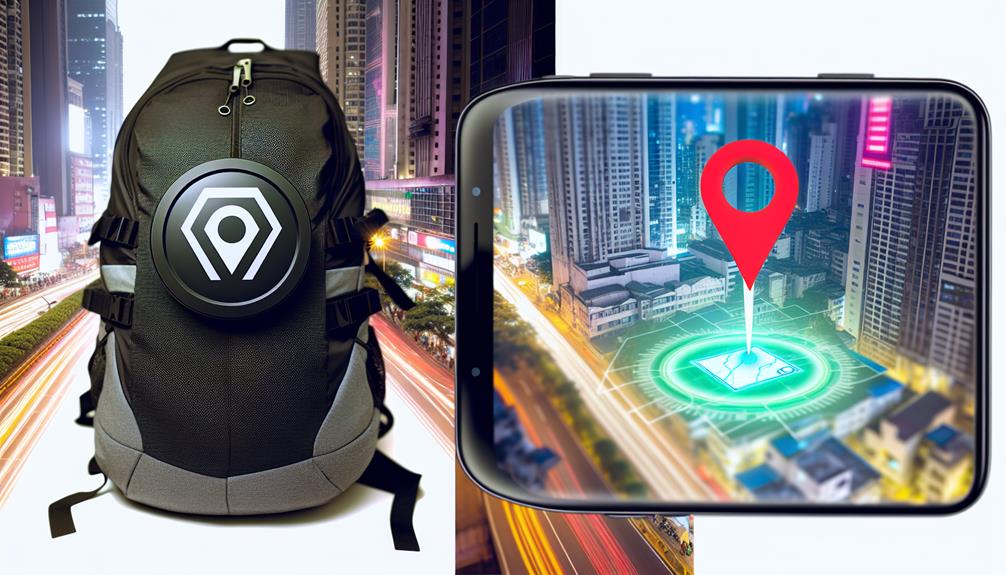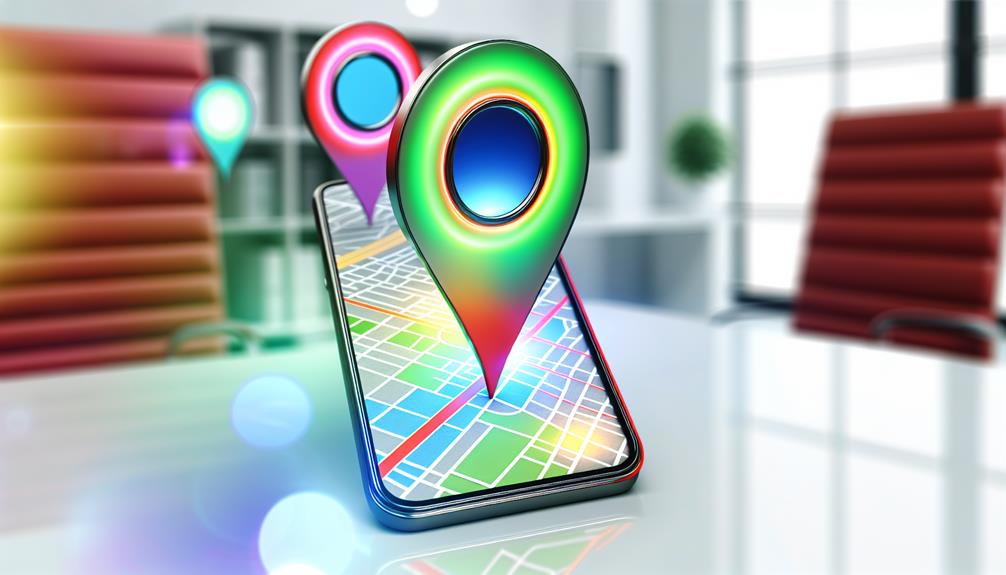If you're curious about whether AirTags function on Android, if they offer any useful features, and if they're worth considering for your device, you're not alone. While AirTags are tailored for Apple users, Android devices can detect them, albeit with notable limitations. You might wonder how basic functionalities compare to those available on iOS, or if alternative tracking solutions might serve you better. Understanding these nuances could greatly influence your choice of tracking technology.
Overview of AirTags
AirTags, Apple's Bluetooth tracking devices, are designed to help you locate personal items like keys, bags, or even your bike. The AirTags functionality revolves around leveraging Bluetooth technology and Apple's Find My network. Once you attach an AirTag to an item, you can track its location using your iPhone, iPad, or Mac. When you misplace an item, you can easily access the Find My app to see its last known location. If the item is nearby, you can use Precision Finding, which provides you with directional guidance using ultra-wideband technology, making it easier to locate your lost possessions.
In terms of Airtags design, these devices feature a sleek, minimalist aesthetic that reflects Apple's commitment to simplicity. Each AirTag is small, lightweight, and includes a user-replaceable battery that lasts about a year. The design also incorporates a speaker that can play a sound to help you find your item when it's within range. Moreover, the AirTags are customizable, allowing you to engrave them with initials or emojis, adding a personal touch.
Security is another key consideration in the AirTags design. They utilize end-to-end encryption, ensuring that only you can see the location of your tracked items. In addition, if someone else's AirTag is found near you, your iPhone will notify you, preventing unwanted tracking. Overall, the combination of functionality and design makes AirTags a practical solution for keeping track of your belongings.
Compatibility With Android Devices
The compatibility of AirTags with Android devices presents a nuanced challenge for users seeking seamless tracking solutions. While AirTags are primarily designed for Apple users, Android users can still derive some benefits. You'll find that AirTags can be detected by Android devices, but this functionality is limited compared to what iOS users experience.
One of the main AirTag benefits is its ability to use the vast Find My network, which is robust and reliable. Unfortunately, Android devices can't connect to this network natively. However, if you stumble upon a lost AirTag, your Android phone can recognize it and display a web page with information on how to return it to its owner. This is a useful feature, but it doesn't offer the full range of tracking capabilities that iOS users enjoy.
On the flip side, Android advantages come from the broader ecosystem of tracking devices available. You might find alternatives that integrate more seamlessly with your Android device and offer features tailored to your needs. While AirTags can be a handy tool, their compatibility with Android may not fully meet your expectations.
Features Accessible on Android

While you won't enjoy the full suite of features that come with using AirTags on an iOS device, there are still some functionalities accessible on Android. When you use AirTags with an Android device, you can benefit from certain features that enhance your Android tracking experience. Here are three key functionalities you can access:
- NFC Tag Reading: If you find a lost AirTag, you can tap it with your Android device. This will bring up a webpage with the contact information of the owner, making it easier to return the item.
- Find My Network: While you can't utilize the full Find My Network capabilities, you can still use any compatible app that supports Bluetooth tracking. This allows you to see if the AirTag has been detected by other Apple devices nearby, providing a rough idea of its location.
- Basic Tracking with Third-Party Apps: Some third-party applications can help you monitor the proximity of your AirTag. Although these apps won't offer the seamless integration that iOS users experience, they can still provide a level of Android tracking that may be useful.
Limitations for Android Users
While Airtags can be used with Android, their functionality is limited compared to Apple devices. You won't have access to features like Precision Finding, which enhances tracking accuracy. Additionally, the Airtag's full capabilities are tied to the Apple ecosystem, making it less effective for Android users.
Limited Functionality on Android
For Android users, the experience with Apple AirTags can be quite limiting. While AirTags are designed primarily for the Apple ecosystem, those who rely on Android tracking face several challenges that impact functionality and user privacy. Here are three key limitations:
- Limited App Support: Unlike iOS users, Android users lack a dedicated app for full AirTag functionality. You can only use the 'Find My' network to locate lost items, which doesn't offer the same seamless experience.
- Reduced Tracking Features: Android users miss out on precision tracking capabilities. The AirTag's advanced features, like the Precision Finding option available to Apple users, are simply unavailable, making it difficult to pinpoint the exact location of your lost item.
- Privacy Concerns: Although AirTags are designed with user privacy in mind, the limited functionality on Android can lead to potential security issues. Since you can't access all features, you may inadvertently expose your location data when using other tracking apps.
No Precision Finding Feature
The absence of Precision Finding greatly hampers the AirTag experience for Android users. While you can still use AirTags to locate your belongings, you miss out on the advanced capabilities offered to Apple device users. Precision tracking, which relies on Ultra Wideband technology, allows for more accurate and intuitive finding of lost items. Unfortunately, this feature is unavailable on Android devices, affecting your overall user experience.
Here's a quick comparison to illustrate the limitations:
| Feature | AirTag (Apple) | AirTag (Android) | Limitations |
|---|---|---|---|
| Precision Finding | Yes | No | No directional guidance |
| UWB Technology | Yes | No | Less accurate location |
| Sound Alerts | Yes | Yes | Basic functionality |
| App Compatibility | Find My app | Third-party apps only | Limited tracking options |
Without Precision Finding, you'll rely on a more rudimentary form of tracking, which can lead to a frustrating experience. The inability to leverage these advanced features diminishes the potential of AirTags, making them far less effective for Android users.
Incompatible With Apple Ecosystem
AirTags are designed to seamlessly integrate within the Apple ecosystem, creating a range of limitations for Android users. If you're an Android user, you'll quickly notice that your experience with AirTags won't match that of iPhone users. Here are three key limitations you'll face:
- Limited Functionality: While iPhone users can leverage features like Precision Finding and notifications when AirTags are nearby, Android devices lack this integration. You can only use basic tracking through the Find My app.
- No Compatibility with Siri: The voice assistant features that come with AirTags, such as using Siri to locate items, are entirely unavailable for you. This means you won't benefit from the hands-free convenience that iPhone users enjoy.
- Restricted Notifications: When an AirTag is detected nearby, Android users are only notified if the AirTag is separated from its owner. You can't access the full range of notifications that make tracking and finding items efficient.
How to Use Airtags With Android

Using AirTags with Android devices is possible, but there are notable limitations in functionality. While you can access basic features like locating an AirTag through NFC, tracking capabilities are restricted compared to using an Apple device. Understanding these compatibility issues will help you make informed decisions about utilizing AirTags as an Android user.
Compatibility With Android Devices
While AirTags are primarily designed for Apple devices, they can still offer some functionality for Android users. The AirTag advantages lie in its ability to help you locate lost items, even if you don't own an iPhone. Here's how you can use AirTags for Android tracking:
- NFC Support: If someone finds your AirTag, they can tap it with their NFC-enabled Android device. This will lead them to a website displaying your contact information, provided you've set it up.
- Find My App: Although you won't have the full experience, you can download certain third-party apps that may offer some tracking capabilities for AirTags. However, their functionality may be limited.
- Limited Notifications: You won't receive notifications about nearby AirTags, but you can still use the sound feature to locate it if it's within Bluetooth range.
Tracking Features Limitations
Though AirTags can provide some tracking capabilities for Android users, several limitations hinder their effectiveness compared to the experience available on Apple devices. One notable limitation is the reduced tracking accuracy. While AirTags utilize Bluetooth technology to communicate with nearby Apple devices, Android users lack access to the vast network of iPhones that enhances location precision. This means you might find it challenging to pinpoint the exact location of your item.
Additionally, the tracking experience is limited when it comes to user privacy. AirTags are designed with privacy features that help prevent unwanted tracking, but these protections can be harder to navigate for Android users. You won't have access to features like the Precision Finding, which utilizes Ultra Wideband technology for accurate location tracking, a key benefit for iPhone users.
Furthermore, Android users can only utilize the Find My app to scan for AirTags nearby, which often results in fewer extensive tracking options. To summarize, while AirTags can work with Android devices, the limitations in tracking accuracy and user privacy greatly reduce their overall effectiveness.
Alternatives to AirTags for Android
If you're an Android user seeking tracking solutions, several alternatives to AirTags can effectively meet your needs. The market for Bluetooth trackers has expanded, offering various options that cater to lost item management while addressing privacy concerns. Here are three significant alternatives:
- Tile: Tile is a well-known name in the Bluetooth tracker space. It boasts a user-friendly app with excellent app integrations, allowing you to track items efficiently. Tile's community feature enhances tracking accuracy by utilizing other users' devices to locate your lost items.
- Samsung Galaxy SmartTag: If you're a Samsung user, the Galaxy SmartTag leverages the SmartThings app for seamless integration. This tracker offers efficient lost item management and competitive tracking accuracy, especially within the Samsung ecosystem. However, it may not be as effective if you're using a different Android device.
- Chipolo: Chipolo offers versatile Bluetooth trackers with a focus on user preferences. Its app supports multiple languages and offers features like out-of-range alerts. Cost considerations are also favorable, as Chipolo often comes at a lower price point compared to competitors.
When comparing these options, consider factors like tracking accuracy, app integrations, and privacy policies. Each tracker presents unique strengths, allowing you to choose one that aligns with your needs and preferences. By weighing these alternatives, you can find a Bluetooth tracker that suits your lifestyle without compromising on functionality.
User Experiences and Feedback

User feedback plays an essential role in evaluating the effectiveness of Bluetooth trackers like Tile, Samsung Galaxy SmartTag, and Chipolo. When looking at user reviews, it's clear that experiences with these devices can vary greatly. Many users have reported positive tracking experiences, noting that these trackers perform well within their intended use cases, such as locating keys or bags in crowded areas. The ease of use, coupled with a user-friendly app interface, often receives high praise.
However, some users have expressed frustration. A common theme in the feedback is the limited range of Bluetooth technology, which can hinder tracking effectiveness, especially in larger spaces. Additionally, users have pointed out that battery life can be a concern, with some trackers requiring frequent replacements.
When comparing these products to Apple's AirTags, Android users often feel at a disadvantage. While AirTags boast seamless integration within the Apple ecosystem, Android users find their options fragmented, leading to inconsistent experiences. This disparity in functionality can affect user satisfaction.
Moreover, the community around these devices plays an important role. Users frequently share tips on maximizing tracking experiences and troubleshooting issues, highlighting the importance of a supportive user base. Overall, while most users find value in Bluetooth trackers, their experiences often depend on the specific device and its compatibility with individual needs and preferences. When considering a tracker, weigh user reviews carefully to find the best fit for your requirements.
Frequently Asked Questions
Can I Track My Airtags Using an Android Tablet?
You can't track AirTags directly with an Android tablet due to AirTag compatibility issues. While you can use certain features, tracking limitations exist, preventing full functionality that iOS users experience with Apple devices.
Are Airtags Waterproof or Water-Resistant?
Think of an Airtag as your trusty sidekick; it's water-resistant, not completely waterproof. With Airtag durability stemming from materials like polycarbonate, it can handle splashes but shouldn't be submerged for extended periods.
Do Airtags Require a Subscription Service?
Airtags don't require a subscription service for their functionality. However, if you're using them with Android, you might miss out on some features, since their full capabilities are designed for Apple devices.
How Far Can Airtags Track Items From My Phone?
Airtags can track items within Bluetooth range, typically around 30 feet. Beyond that, tracking reliability decreases considerably, relying on nearby Apple devices for location updates. The network's density greatly impacts how effectively tracking can occur.
Can I Customize My Airtag's Name and Emoji on Android?
You can't customize your AirTag's name or emoji on Android; those AirTag features are exclusive to Apple devices. While Android compatibility allows basic tracking, personalization options are sadly limited, leaving you wanting more creative control.
Conclusion
In conclusion, while AirTags can be detected by Android devices, their functionality is like a song missing its melody. You'll get basic features, but you'll miss out on the advanced tracking that iOS users enjoy. If you're an Android user seeking effective tracking solutions, consider exploring alternatives that offer full compatibility. Ultimately, choosing the right tracker can make all the difference in keeping your belongings close and worry-free.






Leave a Reply